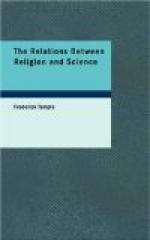For it is undeniable that believers and unbelievers alike are perpetually asking for proofs that shall have more of the scientific and less of the religious character, proofs that shall more distinctly appeal to the senses. Believers in all ages have longed for external support to their faith; unbelievers have refused to believe unless supplied with more physical evidence. Believers shrink from being thrown inwards on themselves; they fear the wavering of their own faith; they are alarmed at the prospect of the buttresses of their belief being taken from them. They find it easier to believe the spiritual evidence, if they can first find much physical evidence. They wish (to use the Apostle’s words) to walk by sight and not by faith. And unbelievers want a tangible proof that shall compel their understanding before it awakes their conscience. They demand a Revelation, not only confirmed by miracles at the time, but confirmed again and again by repeated miracles to every succeeding generation. They want miracles in every age adapted to the science of the age, miracles which no hardness of heart would be able to deny, which would convince the scientific man through his Science independently of his having any will to make holiness his aim when he had been convinced. This kind of evidence it has not pleased God to give. It is not the scientific man that God seeks as such, any more than it is the ignorant man that He seeks as such. And the proofs that He gives are plainly in all cases conditioned by the rule that the spiritually minded shall most easily and most keenly perceive their force.
And, as far as unbelievers are concerned, I do not see that more need be said except to tell them that this rule is inflexible, and that it is by another way that they must look to find God, and not by the way that they insist on choosing. But believers who are in the same case need to be warned of some very real dangers that always attend a faith which makes too much of things not spiritual.
For, first, there is a real and great danger that the spiritual may be altogether obscured by the literal and the physical. We look back with astonishment on the Rabbinical interpretations of the Old Testament, and all the more because of the really great and true thoughts that are sometimes to be found in the midst of their fanciful conceits. We can trace the mischief they did to true Religion by the perverted reverence with which they regarded the words and even the letters, and the very shapes of the letters, in which their sacred books were written. Their perversions of the law of God, their subtle refinements of interpretation, their trivial conceits, their false and misleading comments and inferences, all certainly tended to encourage the hypocrisy which our Lord rebuked, and against which St. Paul contended. But we still see something of the same spirit in the attempt to maintain a verbal and even literal inspiration of the whole Bible, filling it not with the breath of a Divine Spirit, but with minute details of doctrine and precept often questionable, and, whenever separated from the principles of the eternal law, valueless or even mischievous. God’s Word, instead of leading us to Him, is made to stand between and hide His face.




